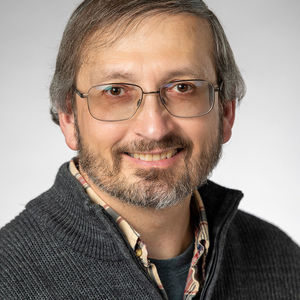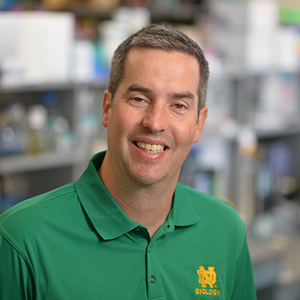Life Sciences: Ecology and Environmental Science and Cancer Biology Summer Scholars Session I & II
Using Notre Dame's state-of-the-art facility, the Jordan Hall of Science, students in the Life Sciences track engage in two major areas of study: Ecology and Environmental Science and Cancer Biology. Both content areas foster collaborative problem-solving skills and experiential understanding of science by actively involving students in the design, implementation, and analysis of experiments in molecular biology (cancer biology and molecular genetics) and environmental science (stream ecology and environmental assessment/restoration).
You will improve proficiency and confidence under laboratory conditions and field situations and directly engage in accurate reading of scholarly journal articles, the structure/function of scientific research papers, posters and seminar presentations, and the use of biostatistical analysis.
The topics covered within these areas highlight both basic research conducted by Notre Dame faculty and the connection of this research to applied fields in industry, medicine, and environmental management. You will investigate these topics using a variety of formats, including interactive lectures, laboratory and field work, collaborative learning, computer and video material, group discussions, and field trips with interpretive naturalists.
In the ecology and environmental science component of the course, you will investigate unique local ecosystems including Warren Dunes, Michigan (ecological succession, geologic history and ecosystem management), Warren Woods, Michigan (ecology of rare, old growth forest) and collect field data for a research project and presentation centering on environmental quality assessments of a local stream ecosystem. During colloquia with Notre Dame researchers, you will have the opportunity to discuss research strategies and review published scientific literature on stream ecology and restoration strategies.
In exploring cancer biology, you will actively engage in the study of cancer by first reviewing the scientific literature on hallmarks of cancer. Next, you will learn how cutting edge cell and molecular biology techniques (e.g., tissue culture, electrophoresis, immunofluorescence, crystal violet assay and immunoblotting) are used to identify the molecular traits of human cancer cells. You and your research team members will analyze data that hold the key to unlocking the molecular markers and mutations in tumor cells, allowing you to design effective chemotherapeutic treatments in our model systems.
You will have the opportunity to learn about cutting edge cancer research being conducted in several Notre Dame research laboratories, interacting with ND cancer researchers via virtual laboratory tours and live Q&A sessions. Student research teams will have the opportunity to present on cancer hallmarks and give their findings regarding characterization of their assigned cancer cell line.
Course Schedule
This course will be offered during Summer Scholars Session I (June 8 - June 22, 2024) and during Summer Scholars Session II (June 29 - July 13, 2024)on campus.
Academic Directors
Mark Olsen

Mark Olsen, associate teaching professor and majors/honors biology laboratory program coordinator, conducted his undergraduate studies at St. Michael’s College in Vermont (B.S. in biological sciences, 1981) and his graduate work at the University of Notre Dame (‘89 M.S., ‘94 Ph.D.). Dr. Olsen’s master’s degree research explored the impact of an introduced crayfish on the community ecology of northern Wisconsin lakes and his doctoral work explored behavioral, physiological, and biochemical adaptations for natural sub-zero temperature tolerance in invertebrates.
A member of the Notre Dame faculty since 1994, Dr. Olsen passionately promotes student engagement in undergraduate research by coordinating the annual College of Science Internship Information Workshop and collaborating with College of Science and Engineering colleagues in implementing a five-year National Science Foundation STEP grant to foster student engagement, undergraduate research, and STEM retention.
In addition to his work with science major intents, Dr. Olsen teaches an environmental science course at Notre Dame that engages non-majors in collaborative exploration of many of today’s environmental problems, causes, and solutions via a lively mix of discussion, field-based environmental assessment, and group seminar presentations. He writes and reviews questions for the National Science Bowl and has served as a resource teacher in Place Based Education for elementary and high school instructors.
Dr. Olsen received the Outstanding Faculty Teaching Award from Notre Dame’s Kaneb Center for Teaching and Learning and is currently a member of the Indiana Academy of Sciences, the National Science Teachers Association, and the Association for Biology Laboratory Education.
David J. Veselik

David J. Veselik, Director of Undergraduate Studies for the Biological Sciences major, coordinator for the Cell Biology Laboratory, Biology Club advisor, and Biology Honors Program co-director, received his B.A. in pre-professional studies in 1996 from the University of Notre Dame. He then conducted graduate studies at Georgetown University where he explored the role of environmental estrogens and the estrogen receptor in the etiology and progression of breast cancer (M.S. 1998, Ph.D. 2006, biochemistry and molecular biology).
Since 2006, David has taught upper level cell biology labs and lectures (BIOS30341/31341), as well as Biology II: Molecules to Ecosystems. For the past several years, he has led the NSF-funded Research Experience for Teachers (RET) Molecular Biology Workshop at Notre Dame in an effort to make local high school biology curriculums more inquiry-based and investigative. In addition to this David has been active in leading and coordinating numerous outreach projects in the Department of Biological Sciences. David received the Dockweiler Award for Undergraduate Advising and is an active member of the NAAHP.